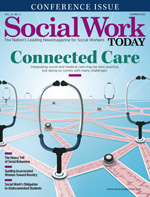|
Imagine a routine trip to the auto repair shop for an oil change that resulted in some underlying conditions being revealed. A close-up of the vehicle’s engine reveals egregious wear resulting from a possible chemical imbalance. This was a problem beyond the shop’s scope, however. As a result, the shop owner had to get in touch with the “engine experts.” No worries, their offices were in the same complex. Upon arrival at the engine experts, you’re asked whether you brought the report from the previous shop. With your mind racing about the exact nature of the problem, you neglected to do so. No worries, the attendant says it won’t be a problem; he’ll call and ask them to fax it over. Unfortunately, that takes a while. Finally, your name is called. An engine expert is going to look over the situation and develop a care plan for how to move forward. He asks a series of questions about the car’s history, including whether it smoked, consumed oil, and has acted wonkily, including the date the erratic behavior began. After the discussion, he retreats inside the restricted area to take a closer look at the car. He confirms the wear was affecting the rest of the car but can’t pinpoint the reason for the chemical imbalance. He thinks it may be emanating from the engine but needs more information. It was going to take a concerted effort to get to the bottom of the problem, but instead, the process felt piecemeal and disjointed. Why was it so difficult to easily share information even within the same organization? Fortunately for car owners, this isn’t how repairs typically go down. However, for those seeking medical and behavioral health care, this is an all-too-familiar scenario. This issue’s cover story (page 10) analyzes the reasons behind this failure and offers possible solutions, none of which are particularly pain-free. As the article points out, medical health providers and behavioral health and social service providers are framed in completely different models. Care is siloed. To eliminate this disconnection will require more than just putting a social worker and a doctor in an office together. Can the industry get there? Technology and common sense would seem to indicate that there is hope, but history tells us that competing interests may be too huge of a hurdle to overcome. |

 Editor’s Note: Overcoming Disconnected Care
Editor’s Note: Overcoming Disconnected Care